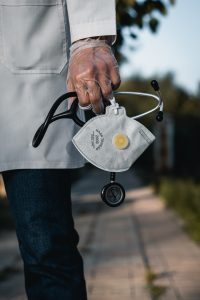As we attempt to navigate through unchartered waters, the concern for most workers who return to work – whether you are a frontline worker or in the private sector and have no alternative but to work – is whether or not you will be covered under Florida Workers’ Compensation Laws if you contract Coronavirus (COVID-19). The good news is you are covered if you are a Florida frontline employee.
Are private sector workers covered for covid? It is not easy as the private worker must prove that Covid or Coronavirus which is considered an occupational disease, was contracted due to a unique risk or exposure  hazard at work; was contracted during employment; and that the nature of employment was the major contributing cause of the disease. Florida law 440.151. This burden is not an easy burden to satisfy, especially for private sector worker which includes, but not limited to, grocery employees, office employees, laborers, support staff workers, restaurant employees, etc. However, as of late, the burden for state frontline workers is no longer as stringent.
hazard at work; was contracted during employment; and that the nature of employment was the major contributing cause of the disease. Florida law 440.151. This burden is not an easy burden to satisfy, especially for private sector worker which includes, but not limited to, grocery employees, office employees, laborers, support staff workers, restaurant employees, etc. However, as of late, the burden for state frontline workers is no longer as stringent.
In April 2020, Florida Chief Financial Officer (CFO) and State Fire Marshal Jimmy Patronis directed the Division of Risk Management to provide workers’ compensation coverage to state frontline employees. The directive/special rules, found in the Chief Financial Officer (CFO) Directive 2020-05, apply only to state frontline employees and not to the private sector workers. Directive 2020-05 states that Florida is going to honor workers’ compensation claims for state frontline employees. Covered employees include state employees who work directly with the public such as police officers, healthcare workers, family protective services investigators and emergency responders. The rules dictate that the burden is on the state to prove that the source of the Coronavirus is a source other than the employee’s work. In summation, it is more likely than not that state frontline employees who contract Covid- 19 a/k/a Coronavirus can expect to receive workers’ compensation benefits without much of a fight.
In the directive Mr. Patronis said, “If we’re going to ask our public servants to fight this pandemic on our behalf, they have to know we’ve got their backs if they get sick. Covid-19 is taking some of our public servants off their feet for weeks. Workers’ compensation insurance was developed to provide our public servants a way to cover a portion of their lost wages and medical costs, so their families don’t have to worry as much. Providing this important coverage to our men and women on the frontline is just the right thing to do.”
Now, while Directive 2020-05 changes the burden of proof when it comes to a workers’ compensation claim for frontline employees this is not the case for the private sector employee. In most occupational illness claims for Covid-19 a/k/a Coronavirus, the worker has the responsibility to prove that they contracted the illness at work. Florida law 440.151 states that the employer is not liable unless the disease results specifically from the nature of the employment and that the danger must be a particular hazard of employment. Florida Statues 440.151(2) states that common diseases that the general public are exposed to are excluded from coverage. However, ordinary diseases of life may still be covered if the risk of contracting the disease is higher for the employee than for the general public. In the case of an illness that is common to the general public, the burden is particularly difficult. The worker must prove that they are susceptible to the illness because of the nature of their work. Again, not an easy burden for the private sector worker.
If you are diagnosed with Covid-19 as a result of your employment, it is important you talk to an attorney before making any decisions that could affect what benefits you are entitled to under the law. Schedule a free consultation with one of our experienced attorneys today to find out whether you are entitled to workers compensation benefits.
 Florida Injury Attorneys Blog
Florida Injury Attorneys Blog


